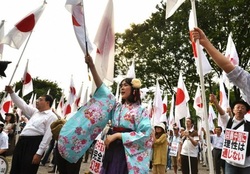 AFP Photo
AFP Photo Each of the LDP candidates has, in some way or another, voiced their support for a much more vigorous foreign and security policy, with Abe and Ishiba Shigeru both stating on a TBS morning program on Monday that Japan should possess a marine-type force capable of repelling any attempt by its neighbours to seize its territory (J). Though not as vociferous in their support for such a measure, both Ishihara and Hayashi both gave support for a re-invigoration of the alliance with the US and other regional partners. What each candidate has not yet explored, however, is how Japan would actually pay for this revamped policy, neither have they explored how a militarily stronger Japan would be perceived by other nations in the region. For all of their rhetoric, the LDP candidates have the luxury of not having to account for any of the pronouncements that they might make on security before the party presidential election, so they are making a variety of statements which merely play to domestic concerns without regard to the wider implications. Such statements have a habit of coming back to haunt politicians, so if each candidate does believe that a more robust SDF is the key to Japan's security, they must also explore how such a force would act in Japan's interests in the face of possible involvement in foreign conflicts.
The manner in which the events of the past three weeks have been handled by China has also left a lot to be desired, it must be said. Although protests outside the Japanese Embassy in Beijing have been prohibited (oh what a joy it must be to work there) (J), Beijing is continuing to use the dispute as a means to apply pressure to Japan and force it to relinguish its claims to the Senkaku Islands. Watching the events in China from afar, other members of the Asia Pacific community have been disturbed by what they see as a blatant attempt by the CCP to use popular dissent as a means of gaining leverage in its territorial dispute with Japan. By pushing popular nationalism as a diplomatic tool, Beijing has reinforced a perception among its neighbours that its intentions are not benign, which has then spurred on efforts by China's neighbours to forge closer security ties with one another to hedge against possible retaliation from China.
In the midst of this dispute, comments made by Chinese General Zhu Chengdu at the Singapore Global Dialogue on the weekend have been met with interest. General Zhu pointed out in an interview with the Australian's Greg Sheridan that the PLA is "slightly less nationalistic than Chinese society as a whole" (which makes sense if you are at the sharp end of any possible conflict with your neighbours) (E), and that nationalism is becoming more of a concern within China. If this is true, then the recent white paper from the SDF that pointed towards a growing rift between China's civilian rulers and their military counterparts over China's foreign policy (J) might have touched on an issue that runs deeper than first anticipated. The accepted wisdom is that the PLA has been pressuring the CCP to take a harder stance on territorial and border issues to match China's growing military capabilities, yet if members of the PLA itself have been questioning the rise of nationalism in China's foreign dialogue, it may be that the PLA is split between those who believe China should not preempt any dispute with its neighbours at this stage in its development versus those who believe that the PLA is sufficiently powerful enough to make demands and back it up with military force.
With no resolution in sight to the dispute (indeed, ceremonies marking the 40th anniversary of the re-establishment of diplomatic ties between China and Japan were cancelled by China on Sunday, although in China the cancellations were referred to as "postponements") (J), the fact that the two institutions at the heart of China's diplomatic and security apparatus are divided on China's future path doesn't exactly bring reassurance to outside observers, for in the absence of any transparent decision process among China's rulers it is exceedingly difficult to determine which particular narrative is garnering the most support. At least (for the time being) popular anger has been sated by the protests against Japan, but if China is divided on the best approach to managing its relations with its neighbours, the potential for territorial disputes to escalate into full-blown conflict is magnified by linking popular resentment at domestic conditions to nationalism. Such situations have led to war, and there is no reason to believe that this could not again be the case.
 RSS Feed
RSS Feed